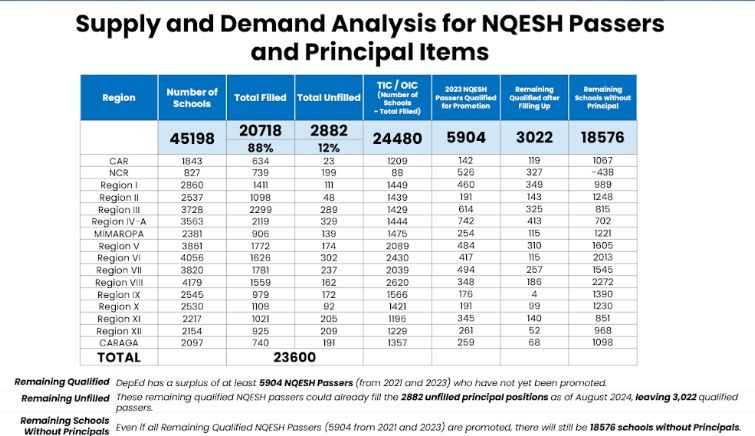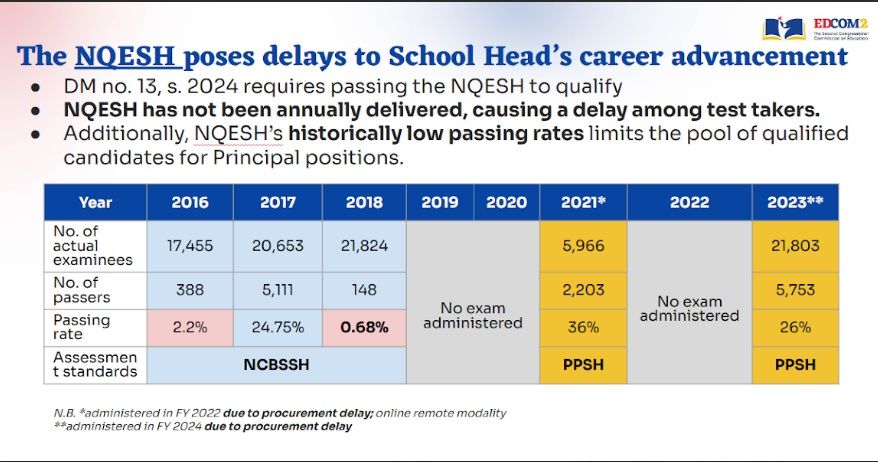'Are you not panicking?': DepEd urged to address 24,480 schools without principals
EDCOM 2 pushes for updating 'outdated' policies for school staffing
The Department of Education (DepEd) has been urged to address the significant gap in the number of schools lacking principals and to implement strategies to better support and develop school leaders.

The Second Congressional Commission on Education (EDCOM 2), in a statement, also emphasized the need to address various issues in staffing school heads, including outdated policies and uncoordinated quality standards.
The need to address the lack of principals, among other concerns, was discussed during a hearing on Nov. 8, chaired by EDCOM 2 Co-Chairpersons Senator Sherwin Gatchalian and Rep. Roman Romulo.
The hearing was attended by DepEd officials, led by Undersecretary Wilfredo Cabral and Assistant Secretary Malcolm Garma.
Also in attendance were EDCOM 2 Standing Committee members Dr. Dina Ocampo of the UP College of Education, Dr. Carmela Oracion of the Ateneo Center for Educational Development, and Dr. Maria Cristina Robles, a former school principal at Navotas National High School.
Severe lack of principals
Based on the data presented by Cabral, EDCOM 2 pointed out that out of more than 45,198 schools in the country, only 20,718 principal positions are filled nationwide. Of the total, there are currently 2,882 vacancies.

Meanwhile, the remaining 24,480 schools have only Teachers-in-Charge (TICs).
However, TICs often lack standardized training and support, limiting their ability to perform effectively.
Cabral noted that even if all remaining qualified NQESH passers were promoted, there would still be 18,576 schools without principals.
The severe lack of principals in schools prompted Romulo to ask DepEd: “Are you not panicking?”
Cabral explained that DepEd is limited by school head staffing parameters dating back to 1997, where Teachers-in-Charge are assigned if there are only one to six teachers in a school.
These schools have no plantilla positions due to a policy from 1997, which set the School Staffing Standards for DepEd schools.
The policy mandates that principals be assigned only to schools, whether single or aggregate, with at least nine teachers for elementary or six teachers for secondary schools.
Romulo then asked DepEd for suggestions to fix the staffing parameters.
In response, Cabral said DepEd has a school organizational staffing standard where each school should have a principal.
“We are currently finalizing the new standards with the help of EDCOM, as it will have budget implications,” Cabral said, detailing the plan to move away from the 1997 staffing parameters based on the number of teachers in a particular school.
Updating the policy
During the hearing, DepEd Order No. 7, Series of 1999 — which is still in effect — was discussed. This mandates that school heads and principals be transferred to other schools after three to five years.
Gatchalian and Romulo raised concerns about the policy, noting that it might not work in some schools, especially in Science High Schools.
“We must rationalize the policies we have,” Romulo said.
EDCOM 2 Executive Director Dr. Karol Mark Yee also emphasized the need to update the policy.
“As we discuss decentralization and empower schools to respond better to their context, it is critical that we ensure each school has a principal, and that each principal is well-trained and supported to ensure learning is happening,” Yee said.
“It is high time for DepEd to rationalize and update DepEd orders on school principals — dating back to 1997, 1999, and 2011 — to ensure that policies are coherent and responsive to our realities today,” he added.
Effective school leadership
Recent consultations and research by EDCOM 2 indicate that strong school leadership plays a crucial role in driving school success and enhancing learner achievement.

“Our own consultations in EDCOM show that school heads have a profound impact on teacher behavior, teamwork, job satisfaction, and student learning,” Yee said.
“In many schools we visited, it was clear that one of the main factors in improving the quality of education is having a good school principal,” he added.